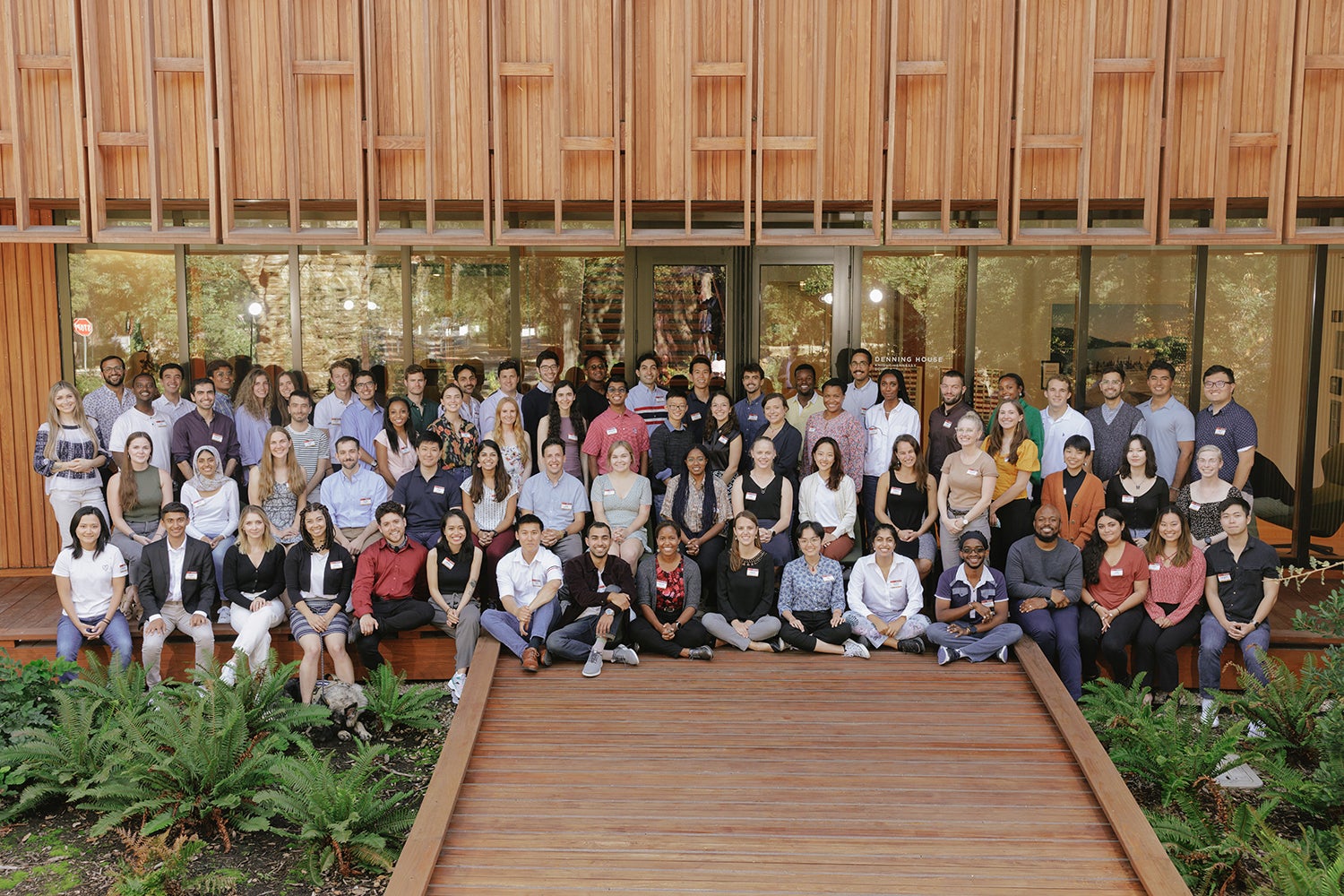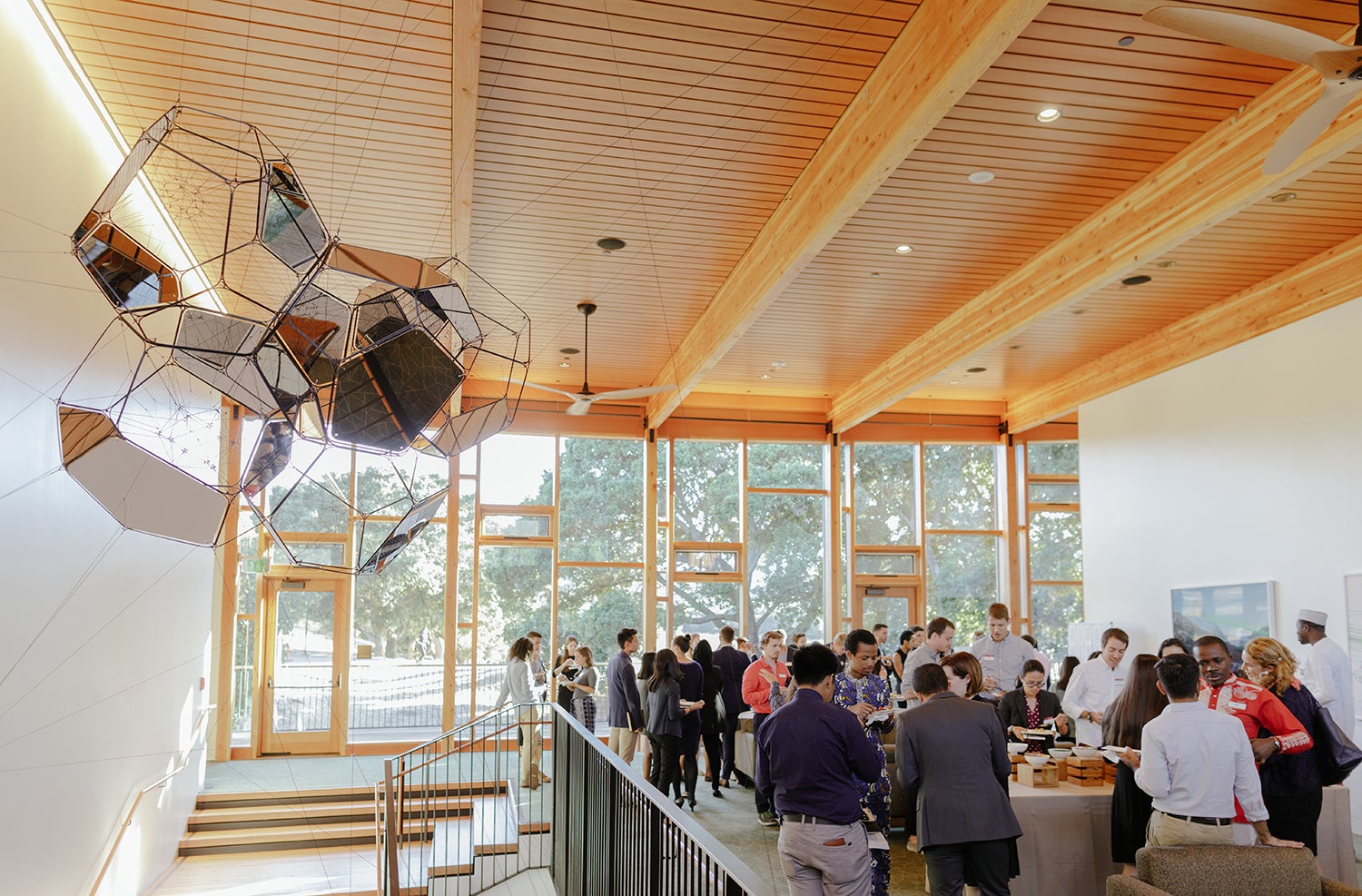In 2021, Briana Mullen, a member of the 2020 Knight-Hennessy Scholars (KHS) cohort, pitched a bold idea during the annual KHS KHeystone Project Ideas Festival, which provides scholars with the opportunity to invite other scholars to join them in addressing a pressing local or global problem. She wanted to start an organization to prepare underserved community members for roles on their local school board.

The 2022 cohort of Knight-Hennessy Scholars was welcomed to Denning House for orientation the week before classes started. (Image credit: Micaela Go)
Fast-forward two years, and more than a dozen scholars have taken part in launching Education Justice Academy, a nonprofit organization developing a network of school board leaders who are better equipped to serve the diverse communities they represent.
“I knew from my own experience as an educator that many school board members are poorly supported and unrepresentative of the communities and schools they serve,” recalls Mullen, who is pursuing master’s degrees in policy, organization, and leadership studies at Stanford Graduate School of Education and in public policy at the School of Humanities and Sciences. “Knight-Hennessy Scholars supported me from day one with advice, startup funds, and a network of supporters to cheer me on. As a first-generation college student, with support from KHS, I felt equipped to launch and lead this statewide initiative.”
Mullen’s experience is just one example of Knight-Hennessy Scholars’ commitment to creating a multicultural and multidisciplinary community for learning, and her journey is one of many inspiring stories that have unfolded in the five years since the program welcomed its first cohort to campus.
Visionary, courageous, and collaborative
As the largest, fully endowed graduate fellowship in the world, Knight-Hennessy Scholars has made bold strides toward cultivating a vibrant community of global changemakers who will drive positive impact during and after their time at Stanford.
To date, the program has awarded funding to 339 scholars representing 62 countries and 85 degree programs across all seven Stanford schools. Cohort size has been growing, with 70 scholars enrolled in the 2022 cohort, and 85 new scholars entering in the fall.
“Over the past five years, KHS has become a diverse community where scholars can discuss different approaches to resolving the biggest challenges we face around the world. The variety of disciplines and experiences enhances the depth of engagement and allows scholars to learn across many disciplinary boundaries,” says John Hennessy, the Shriram Family Director of KHS and Stanford University’s 10th president. Hennessy and Phil Knight, MBA ’62, co-founded KHS in 2016, and the organization welcomed its first cohort of 50 scholars in 2018.
Knight-Hennessy scholars receive up to three years of financial support to pursue graduate studies at Stanford while engaging in multicultural, multidisciplinary experiences that prepare them to be visionary, courageous, and collaborative leaders. Above all, the program looks for applicants who demonstrate independence of thought, purposeful leadership, and a civic mindset.
Convening scholars for creative collaboration
Cross-pollination is a defining element of the KHS experience, and the program creates a host of opportunities for students from many different fields, cultures, and backgrounds to convene.
“I think this is a great model for solving real-world problems because the problems in the world do not care what discipline you’ve studied,” says Ayo Dada, a member of the 2019 cohort working toward a PhD in psychology. “These problems are multifaceted, so to make a difference, you need to have familiarity with all kinds of domains. The Knight-Hennessy Scholars community exemplifies the interdisciplinarity that Stanford is known for, and I’ve benefited greatly from that.”

“Space matters in creative problem-solving. We know that high ceilings, large windows with access to nature, and provocative artwork all encourage more expansive thinking,” says KHS Executive Director Tina Seelig of Denning House. (Image credit: Micaela Go)
Denning House, with its stunning architecture and inspiring art collection, serves as the day-to-day hub for scholar meetups, guest lunches, and a variety of other pop-up experiences, including scholar-driven events most days of the week. The setting, overlooking Lake Lagunita at the heart of campus, is warm and welcoming and provides the community with a dedicated space for planned and spontaneous gatherings.
“Space matters in creative problem-solving,” says KHS Executive Director Tina Seelig. “We know that high ceilings, large windows with access to nature, and provocative artwork all encourage more expansive thinking. Denning House was designed to be inspirational and to help our scholars be aspirational.”
Beyond Denning House, quarterly retreats at Asilomar in Monterey and Stanford Sierra Camp in South Lake Tahoe provide opportunities for scholars to forge connections, while travel-study trips to destinations including Costa Rica, Germany, Turkey, and South Africa have exposed scholars to different cultures and new perspectives on global challenges. These experiences contribute to stronger relationships and innovative thinking.
“Understanding how we all come from different places with our own experiences and ideas was the best gift I could have imagined,” says Juanita Fonseca-Duffo, a member of the 2021 cohort who earned a Master of Laws degree. “Now it’s helping to shape what’s next in my life.”
Programming that fosters leadership
Through the King Global Leadership Program, which is core to the KHS experience, scholars develop the skills, knowledge, and mindset they need to tackle global challenges. Lunchtime and evening programming maps to a different theme each quarter, including McMurtry Leadership Lectures with speakers such as Nobel laureates Frances Arnold and Malala Yousafzai, renowned social scientist Raj Chetty, and architect Jeanne Gang. A recent Q&A session with James Manyika, Google’s senior vice president of technology and society, about the ethics of AI sparked a series of follow-up conversations among scholars.
“Each quarter, we curate a collection of experiences for our scholars to help them bring ideas to fruition,” Seelig adds. The KHS team has identified three themes for its leadership programming for next year: The Future of Education, Living a Fulfilling Life, and Civil Rights Around the World.
Programming for the KHS community also includes the Kheystone Project, where Mullen first introduced her education justice initiative. During the Fall Ideas Festival, scholars pitch their mission-driven ideas to elicit feedback, find mentors, and entice fellow scholars to join in. Following up on the fall festival, a spring showcase is an invitation for scholars to present their work and gain further support. Now in its third year, Mullen has launched Education Justice Academy as a nonprofit.
Community engagement
As it celebrates its fifth anniversary, KHS renews its commitment to building bridges across the broader Stanford community. The inaugural KHS Faculty Fellows provide a vital network across each of Stanford’s seven schools, and support scholars with input, ideas, and counsel. Other members of the Stanford faculty serve on the KHS advisory board, and many have supported admission efforts by interviewing scholar finalists.
Knight-Hennessy Scholars invites the local community to schedule a tour of Denning House and its art collection, which features work by artists Nick Cave and Teresita Fernández, among others.
As the KHS program grows and expands, so too does the pool of engaged alumni. During his time as a Knight-Hennessy scholar, Khalil Fuller – part of the inaugural 2018 cohort – started Gift Card Bank, a nonprofit organization that to date has managed the distribution of more than $40 million in gift cards to families in need. “Scholars from my cohort were part of the founding team for Gift Card Bank, and KHS helped to kick-start the project. Their initial grant gave me confidence that people would support my idea,” he recalls.
Reflecting on how it feels to be an alumnus, Fuller says, “Every time I walk into Denning House, I’m struck with a sense of appreciation and a sense of responsibility. The expectation to continue to do good in the world has a positive effect on scholars. I need to live up to the promises that I made.”
The sixth cohort of 85 Knight-Hennessy Scholars joins the community in September. Prospective scholars can learn about applying to KHS on the Admission page.